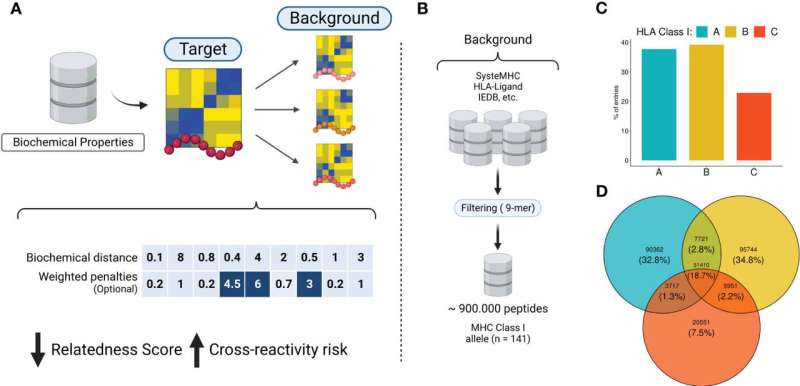This article has been reviewed according to Science X's editorial process and policies. Editors have highlighted the following attributes while ensuring the content's credibility:
fact-checked
peer-reviewed publication
trusted source
proofread
New tool predicts if immunotherapy will mistakenly attack healthy cells

Researchers at the University of Houston are working to make T-cell immunotherapy safer, developing a tool called CrossDome, which uses a combination of genetic and biochemical information to predict if T-cell immunotherapies might mistakenly attack healthy cells.
T-cell based immunotherapies hold tremendous potential in the fight against cancer and infectious diseases, thanks to their capacity to specifically target diseased cells, including cancer metastasis. Nevertheless, this potential has been tempered with safety concerns regarding the possible recognition of unknown off targets displayed by healthy cells.
In one case, scientists created special T-cells that were supposed to target a protein found in a type of skin cancer called melanoma. However, these T-cells also ended up attacking a different protein found in the heart cells of some patients. This caused severe damage to the heart.
"Our CrossDome tool helps predict the potential risks of T-cell-based immunotherapy. It uses a combination of different types of information (called multi-omics) to make predictions and identify whether the treatment might accidentally harm healthy cells in addition to targeting the intended diseased cells," said Dinler Antunes, assistant professor of Computational Biology and member of the Center for Nuclear Receptors and Cell Signaling. His work is published in Frontiers in Immunology.
"By analyzing various factors, CrossDome provides insights into the safety of T-cell-based immunotherapies and may help researchers develop safer treatments."
To test the effectiveness of CrossDome, Antunes and Andre F. Fonseca, a postdoctoral fellow in Altunes' lab, used it to predict potential mistakes in 16 well-known cases of T-cell cross-reactivity, including the melanoma-heart damage case. The tool successfully identified the heart protein as a potential target for the T-cells, ranking it as a high-risk candidate among thousands of other proteins.
Strengthening the results, Antunes combined information from different functional data sets to help assess how much certain genes are expressed and how likely they are to bind with a certain molecule called HLA, to trigger an immune response.
"This information helps us decide which potential off-target genes are worth testing in experiments," said Antunes.
CrossDome users can be either technical or non-technical. It has features that allow more advanced control for those who know how to code, as well as an easy-to-use interface for those who don't have coding experience.
More information: Andre F. Fonseca et al, CrossDome: an interactive R package to predict cross-reactivity risk using immunopeptidomics databases, Frontiers in Immunology (2023). DOI: 10.3389/fimmu.2023.1142573



















